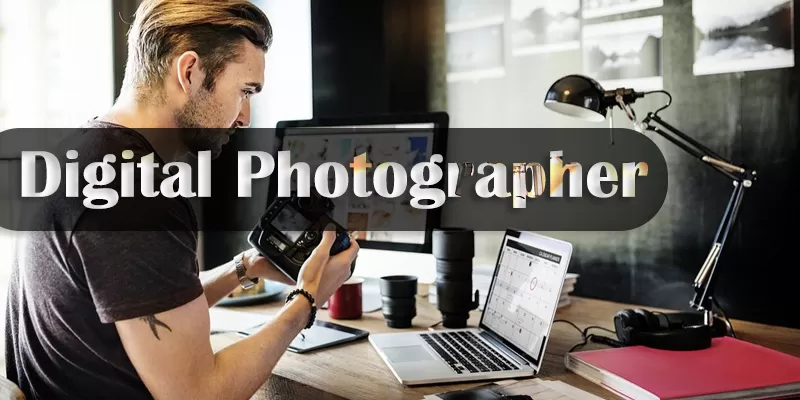
ITI Trade: Digital Photographer (Powered by NCVT)
The ITI Trade Digital Photographer, approved by NCVT, is a job-oriented course designed to prepare candidates for careers in government, private sectors, and self-employment. The course equips trainees with essential photography skills tailored to meet both Indian and international industry standards.
Course Overview
The Digital Photographer trade under the Craftsmen Training Scheme (CTS) is a one-year (two-semester) professional course delivered nationwide through a network of ITIs. The program offers comprehensive training in Trade Theory, Trade Practical, and Employability Skills. Upon successful completion, trainees receive the National Trade Certificate (NTC) awarded by NCVT, recognized across India and internationally.
Job Roles After Completion
Trainees who complete this course will be skilled to work in various photography domains including:
- General Photographer: Captures images for personal, commercial, or artistic use.
- Press Photographer: Covers news events, state functions, and public gatherings for newspapers and magazines.
- Aerial Photographer: Shoots images from aircraft for surveys, planning, and military purposes.
- Videographer & Multimedia Professional: Engages in video production, documentaries, music videos, advertisements, and live events.
Graduates may find employment in:
- News Agencies and Publications
- Advertising Agencies
- Studios and Multimedia Companies
- Event Management and Wedding Photography
- Government Departments (e.g., Tourism, Forest/Wildlife)
- Self-employment as Freelance Photographers or Entrepreneurs
Scope of Work
Post-training, candidates are equipped to:
- Create short documentaries, news items, interviews, wildlife photography, and fashion shoots.
- Engage in professional photography for events, advertisements, serials, and live broadcasting.
- Perform video shooting, post-production editing, and sound dubbing.
- Deliver content for seminars, industrial videos, music events, and domestic photography needs.
Learning Outcomes
Generic Learning Outcomes
- Apply safe working practices and ensure environmental compliance.
- Perform elementary first-aid and respond to workplace emergencies.
- Communicate effectively using technical English and practice teamwork and soft skills.
- Promote energy conservation and minimize environmental pollution.
- Develop personal finance, entrepreneurial skills, and contribute to societal growth.
Specific Learning Outcomes
- Understand and work with different types of lenses.
- Apply lighting techniques for indoor/outdoor photography, including daylight and artificial lighting.
- Execute portrait, studio, commercial, sports, fashion, landscape, night, and wildlife photography.
- Operate digital editing software for image enhancement and printing.
- Utilize multimedia applications and photo editing software to organize and share images.
- Understand video equipment operations and perform audio-video recording and editing.
- Demonstrate motion picture photography, post-production, and planning techniques.
- Develop proficiency in audio recording, mixing, and dubbing.
Course Structure
Semester I
- Safety, Environment, and Electrical Basics
- Introduction to Digital Cameras (Compact & SLR)
- Lighting Techniques (Natural Light, Tungsten, Fluorescent, Flash)
- Exposure Meters and Reflectors
- Practical Photography: Portraits, Studio, Commercial, Sports, and Wildlife
- Introduction to Computers and Monitor Calibration
- Digital Editing Software and Image Transportation
- Multimedia in Photography and Photo Editing Workflows
- Image and Graphics Handling
- Essential Skills for Successful Photographers
- Procurement and Use of Quality Camera Equipment
Semester II
- Video Equipment and Operations
- Basic Principles of Video and Audio Recording
- Motion Picture Photography and Editing Techniques
- Lighting Principles for Studio and Outdoor Shoots
- Pan-Tilt-Zoom Techniques using Digital Video Cameras
- Audio Recording, Mixing, Editing, and Dubbing
- Three-Point Lighting for Studio Shoots
- Shooting Documentaries, Interviews, News, Advertisements
- Post-Production Workflow
- Planning and Execution of Production Projects
Practical Training & On-the-Job Exposure
- First Semester: Practical sessions on lighting, lenses, and photo editing; field visits to studios for hands-on experience with video cameras and accessories.
- Second Semester: Real-world training on video shoots, lighting setups, audio recording, and post-production. Includes two weeks of on-the-job training in professional studios.
Project Work & Assessment
- Assignments on photo shoots, editing, and multimedia projects.
- Development of a portfolio featuring portraits, landscapes, events, and studio work.
- Final assessment based on practical skills, theoretical knowledge, and employability skills.
Career Opportunities
After successful completion of the course, trainees can pursue roles such as:
- Professional Photographer
- Videographer/Editor
- Studio Assistant
- Media Content Creator
- Freelancer or Entrepreneur
